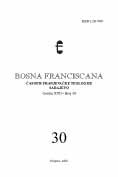Vicenzo Dandolo – reformator crkvenih prilika u Napoleonovoj Dalmaciji (1806-1809)
Vicenzo Dandolo – the Reformer of Church Conditions in Napoleon’s Dalmatia (1806-1809)
Author(s): Ivan PederinSubject(s): History
Published by: Franjevačka teologija Sarajevo
Summary/Abstract: Dalmatia was by the peace treaty of Bratislava (Pozun, Pressburg) 1805. acquired by Napoleon and annexed to the Kingom of Italy in 1806. By the peace of Schönbrunn Napoleon acquired the land south of the river Sava he set up the Privinces Illyriennes and annexed it to France. He appointed the Italian scientist Vincenzo Dandolo to provveditore generale in Dalmazia ed Albania. In the span of 1806-1809. Dandolo started reforming the Church in Dalmatia following in part the suggestions of his adviser Giuseppe Gregorio Scotti, bishop of Nin in Dalmatia. Dandolo’s intent was to reduce the large number of twelve bishops in Dalmatia, and one more in Russia occupied Kotor by to two archbishops in Split and Zadar and two bishops in Makarska and Krk in order to save money. Scotti saw the state savings only Dandolo’s intent was to employ the saved money to build up a modern school system in Dalmatia, but he also converted some monasteries to military barracks or hospitals. He updated also the few Greek-orthodox monasteries in Dalmatia and Napoleon decreed this religious community to have their own bishop who would rule also the southern Orthodox community in Boka, that was up to now strongly infl uenced by the prince archbisop of Montenegro. The bishops welcomed the new administration in Dalmatia and Dandolo was by no means hostile to the Church, but the Church was for him and the Napoleonic administration just a cultural institute and the start point of the public morally. Following the insurgency due to the ruthless militarism of Marshall Marmont the Church engineered the insurgencies to the French rule.
Journal: Bosna Franciscana
- Issue Year: 2009
- Issue No: 30
- Page Range: 81-103
- Page Count: 23
- Language: Croatian
- Content File-PDF

